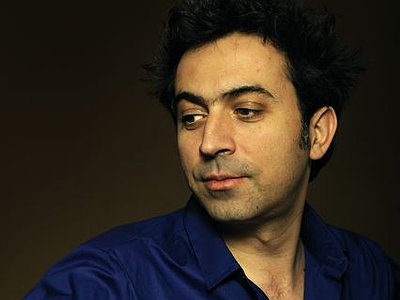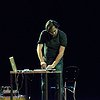When did you start composing - and what or who were your early passions and influences?
I started composing when I was about 9 or 10 years old - after first hearing a Brahms symphony. Then when I was about 11 or 12, I heard Xenakis for the first time (Nomos Gamma) and was totally blown away. I knew for sure that's all I wanted to do - compose music that did what that piece did to me! I have to clarify this by saying that when we lived in Cyprus, my father ran a live music venue - so I was exposed heavily to mostly pop music from Greece and the middle east. It was only when we emigrated to Britain after the war in 1974 that I first heard western classical music. After that growing up in London I had lots of musical influences. I played violin and piano, I got into Jazz when I was a teenager. Then I travelled with my violin in Greece when I was 18 and fell in love with Greek traditional music, learning the Ud amongst other instruments.
What do you personally consider to be incisive moments in your work and/or career?
Being exposed to living folk music traditions in my travels through Greece, then going to university and feeling that I couldn't really fit back in the classical music system. I wanted to find a way to compose that was true to my own eclectic musical interest. I wrote a piece called 'No One's Filming' when I was a student that got a lot of attention and was played at the South Bank in London and broadcast on the radio. That gave me the confidence to just do my own thing, rather than following a particular trend. Another important break through was when I won the Gaudeamus Prize for 'a conSPIracy cantata'.
I wrote this piece in my late twenties when I was having a bit of a crisis as to what and how I was composing. I solved it by just stripping the harmonic language down to basics, opening up the musical space beyond gesture and harmonic rhythm, and letting the sounds from my environment into the piece in the form of recordings, voices and found sounds.
What are currently your main compositional challenges?
I've been thinking a lot about imagined voices the last years, and searching for ways of using different combinations of sound and text to influence how we perceive music. I'm interested in how music speaks and what voices it conjures. I see music primarily as a communication medium and I'm interested in highlighting or revealing the modes by which it operates. And trying to have fun with it at the same time.
What do you usually start with when composing?
I find it difficult to do anything unless I have a concept or point of view on some material. I'm not the type of musician who can just come up with something out of the blue without a context. Usually curiosity leads the way - a hypothetical situation - what if this world would collide with this other one? Or could one make music out of such and such a situation?
How do you see the relationship between timbre and composition?
Timbre is a term that I don't really think too much about. It's a word loaded with a kind of 20th century, new music thinking. I also don't want to put a lot of weight in it within the composition or promote it to a higher priority in the discourse of a piece, so that the music becomes too 'aesthetic' for its own sake.
The physicality, the balance or the 'grain' of the sound is a way that I prefer to think about it - but to me this is something imbued with meaning rather than being driven out of an aesthetic choice to make beautiful sounds.
What do improvisation and composition mean to you and what, to you, are their respective merits?
For me improvisation is something I can only do (on stage) with other people. This is why I don't consider myself an out-and-out improviser. When I play solo I would much rather prepare something in advance. And for me this is the difference. Improvisation for me is a way of making music as a conversation with others, and composition is something that may involve some of the same thoughts and intuitions as in improvisation but is about conceptualising the context, language, dramaturgy of the music on one's own.
Do you feel it important that an audience is able to deduct the processes and ideas behind a work purely on the basis of the music? If so, how do you make them transparent?
I think each person has a totally subjective and valid point of view when listening to music. I have no expectations that an audience picks up any intended concepts in a piece of music. In this way - I also don't think there is one way of listening to music. But I do think that music cannot come into existence outside a context or a concept, whether a composer is aware of it or not. Being aware of the ideas and context that surrounds a given piece or music will always enrich the listening experience.
So how to bring attention to the ideas behind a work? One way is to set up the piece in the form of a question - and work on the edge of a convention or juxtaposing conventions - so that the audience has to ask the question - what am I listening to? Why is the music doing this?
The relationship between music and other forms of art – such as painting, video art and cinema - has become increasingly important. How do you see this relationship yourself and in how far, do you feel, does music relate to other senses than hearing alone?
I'm very keen on working with other mediums, I use text video quite often as a way of setting up a dialogue with the music. What interests me most is the way that a medium, beyond sound itself, can function as music. How meaning, emotion, musicality from one medium can influence another - even problematise the other. In this way, I don't think hearing alone is ever what music is about, it always exists in an ecosystem of other senses, and these can be used to create interesting inter-relations. I think that other media are often used with music to amplify what we are hearing or seeing - I'm not too keen on this way of dealing with it - I prefer when the 'other' media are used to challenge or ask questions of each other.
How would you define the term “interpretation”? How important is it for you to closely work together with the artists performing your work?
I'm getting more and more relaxed about the idea of a performer bringing their own interpretation to a work. I now find it essential. Once a musician genuinely internalises the piece, then I'm happy however they do it. Especially in a performative situation - it's always exciting to see how different performances of the same piece can be. But I do like working with musicians in the development of a piece - they can bring technical and performative experience to the table that can steer the piece in an exciting direction.
The effect of a piece doesn't merely depend on the performance of the musicians, but also on the place it is performed at. How do you see the relationship between location and sound? In how far do you feel the current system of concert halls is still the right one for your music – or for contemporary music in general?
Yes - location is hugely important and of course we are not talking about acoustics, but as you suggest - how the social environment effects how music is experienced. I don't have an answer in the form of an ideal space where music can be heard. The concert hall is indeed rooted in antiquated conventions that can have a unwanted effect on the musical experience, but it's also a space that has a unique discipline of quietness that allows us to focus on the music. But then, it comes with a lot of baggage and it's alienating for some people.
From my experience from working in a sound installation context, you have to create the space within the work itself which gives more freedom to how the spectator comes to the music/sound. But then you don't always get that concentrated attention over a long period of time that you can get in a concert hall. I'm very much into the idea of an artist creating a particular space for the work as an aspect of composition, but that is not always possible.



